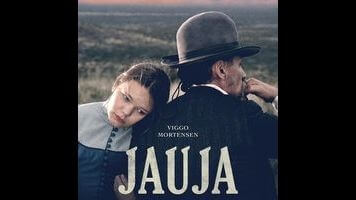Viggo Mortensen loses himself in the droll, mysterious Jauja

A droll, primitivist Western, minimal in everything except texture, Jauja unfolds in a seemingly prehistoric landscape of volcanic rock and tuft grass. This is Patagonia, sometime in the 1880s, framed in boxy Academy ratio, with the edges rounded off to resemble early photography. Here, Danish settler Captain Dinesen (Viggo Mortensen, very good) wakes up in his tent to discover that his daughter has run off with a soldier, into the territory of the cross-dressing bandit Colonel Zuluaga. Everything signals birth—of Argentina, cinema, the nuclear family—until Dinesen descends into a womb-like cave and Jauja takes a hard left turn into enigma. Even the title is a mystery, the Spanish byword for a land of plenty.
Jauja’s director, Lisandro Alonso, makes earthy, obtuse movies that seem to be pulling toward a more primitive world, as though it were a current in the sea. Violence, isolation, and father-daughter relationships figure as essential creation myths. Nonetheless, Jauja marks a major departure: a period film that brings to mind 19th century fiction in its dialogue and caricatures (a French-speaking dandy; a haughty officer with an unseen dwarf assistant; Dinesen himself) and a stripped-down take on the American Western in its elemental sense of unknown terrain. And then, just like that, it becomes a riddle.
Captain Dinesen is the figure that holds it together: A stranger in a strange land, face scrunched in exasperation, fumbling with language and landscape, at once fixated on his daughter and oblivious to the idea that she might have an inner life. Mortensen, a Danish-American who grew up in Argentina, is likely the only person who could play him, and probably the reason a genuine curio like this could get funded. (He also wrote the lovely, very sparingly used electric guitar score.) Made with non-professional casts and next to no dialogue, Alonso’s previous features have been notoriously—and, for many viewers, off-puttingly—slow and cryptic. Mortensen injects the director’s esoteric, anti-psychological themes with a psychological reality that makes them all the more tantalizing.
Working with Timo Salminen, a Finnish cinematographer best known for his hyperrealist lighting, Alonso crafts saturated, fine-grain images of the Patagonian wilderness. Jauja is set almost entirely outdoors, in bright daylight, with the 35 mm stock—still at an advantage over digital when it comes to direct sunlight—registering every fluttering moss, wisp of cloud, and wind-stirred tide pool. There’s no empty space in its deep-focus compositions; when the camera moves, it’s in awkward, swiveling jerks that recall the first decades of filmmaking. Again, there’s that sense that a birth is being re-staged, and we’re returning to the days when just filming and projecting something constituted a kind of miracle. Except that this something is imaginary and, not to put too fine a point on it, imaginative. A bare horizon is like a black-box stage; it invites the viewer to accept the unseen, and treats every intrusion—a flayed body, a stray dog, a hand creeping into the frame out of nowhere—as an event.